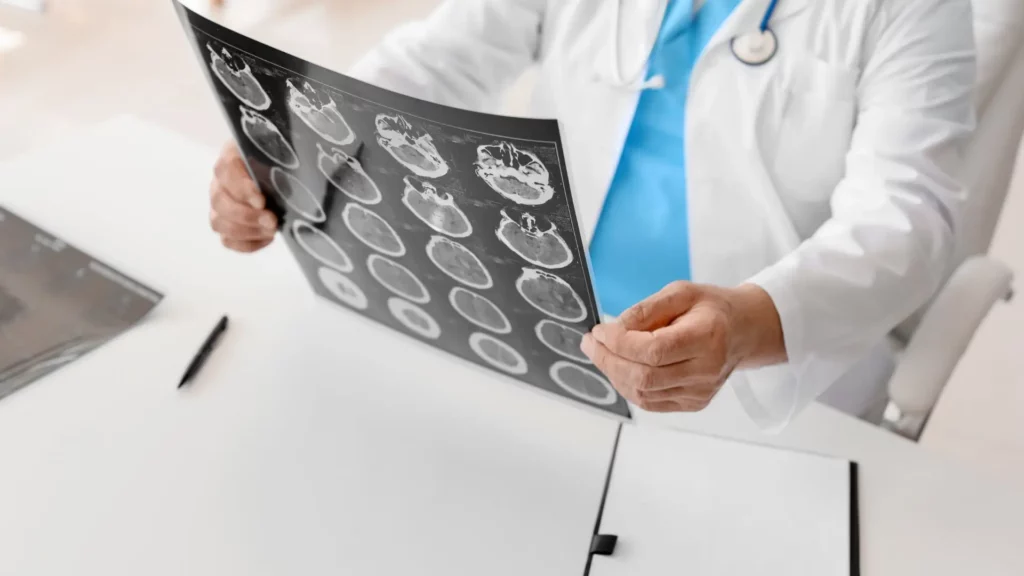In the wake of a brain injury, life can feel like a relentless storm. It’s not just about facing the injury itself, but also the wave of legal and financial uncertainties that follow. This is where we step in. As dedicated California brain injury lawyers, we’re not just here to guide you through the legal maze; we’re here to light your path back to hope. With compassion at the heart of our practice, we understand the challenge you’re facing—emotionally, physically, and financially.
Our mission is to shoulder the weight of these worries, focusing on securing the compensation you need for medical expenses, lost wages, and emotional suffering. We’re more than legal advisors; we’re your advocates, committed to ensuring you recover compensation and never feel alone in this journey.
To schedule a free consultation with our top-rated personal injury lawyers, we welcome you to contact us by calling (213) 927-3700 or filling out our quick contact form.
The Role of a California Brain Injury Lawyer
Neama Rahmani, co-founder and President of West Coast Trial Lawyers, guides our California Brain Injury Division with over two decades of civil and criminal law experience. He entered UCLA at just 19 and graduated from Harvard Law School at 22—making him one of the youngest graduates in Harvard’s history. Throughout his career, Neama has handled thousands of cases, recovering over $1 billion for clients, and he regularly appears on major networks like CNN, Fox News, and the BBC.
Under Neama’s expert guidance, our team is committed to providing top-tier representation, harnessing the full power of legal advocacy to navigate the complexities of brain injury lawsuits and achieve the justice and compensation our clients deserve. Traumatic brain injury statistics reveal the significant prevalence, impact, and demographics associated with TBIs in the U.S., highlighting the importance of specialized legal representation.
The Importance of Finding A Local Brain Injury Lawyer In California
When you have suffered a brain injury in an accident, hiring a local attorney can make all the difference in navigating your case effectively. As local lawyers understand the specific laws, regulations, and court systems in your area, they can give you an edge when it comes to building a strong case. In addition to their legal knowledge, local attorneys often have connections with local experts, investigators, and resources that can be crucial to your claim.
Here are some other benefits you can get of working with a local brain injury lawyer:
- In-depth knowledge of local laws: Each city in California has its own nuances when it comes to handling brain injury claims.
- Familiarity with local courts and judges: A local attorney knows the preferences and tendencies of judges and other legal professionals in the area.
- Accessibility and personalized service: Meeting your attorney in person can provide peace of mind and foster clear communication throughout the process.
If you’re looking for an experienced local brain injury lawyer, we proudly serve clients in cities across California. Explore the links below to find help in your area:
- Los Angeles
- Irvine
- San Bernardino
- Long Beach
- San Francisco
- Newport Beach
- Woodland Hills
- Sacramento
- Pasadena
- Solana Beach
- San Jose
- Bakersfield
- Riverside
- Fresno
- San Diego
- Beverly Hills
- Santa Ana
- Fullerton
- Valencia
- West Covina
- Visalia
- Glendora
- Palm Springs
Understanding Brain Injuries
Brain injuries can be life-altering, affecting not just the individual but also their families and loved ones. Understanding the nature of these injuries is crucial for seeking appropriate medical and legal help. Brain injuries can range from mild concussions to severe traumatic brain injuries (TBIs), each with its own set of challenges and implications.
Severe brain injury cases often involve complex legal, medical, and personal ramifications, necessitating specialized legal representation. Severe traumatic brain injury can lead to serious complications, including altered consciousness, coma, or even brain death, highlighting the critical need for ongoing medical intervention and monitoring.
What Is a Traumatic Brain Injury (TBI)?
A traumatic brain injury (TBI) is a disruption in the brain’s normal function caused by a bump, blow, or jolt to the head, or a penetrating head injury. TBIs can vary in severity, from mild cases like concussions to severe traumatic brain injury that can lead to long-term disability or even death.
According to the Centers for Disease Control and Prevention (CDC), TBIs are a leading cause of death and disability in the United States. The impact of a TBI can be profound, affecting cognitive abilities, physical health, and emotional well-being.
Common Causes of Brain Injuries
Brain injuries can occur due to various reasons, each presenting unique risks and challenges. Some of the most common causes include:
- Falls: Falls are the leading cause of traumatic brain injuries, particularly among older adults and young children. Slips, trips, and falls can result in significant head trauma.
- Motor Vehicle Accidents: Car, truck, and motorcycle accidents are major contributors to severe head trauma, often leading to brain injuries. The force of impact in these accidents can cause the brain to collide with the skull, resulting in injury.
- Sports and Recreational Activities: Contact sports such as football, hockey, and soccer carry a high risk of brain injuries. Even non-contact sports can pose risks if proper safety measures are not followed.
- Violence: Assaults, gunshot wounds, and domestic violence are significant causes of traumatic brain injuries. These incidents can result in severe and sometimes fatal brain damage.
- Explosions and Blasts: Military personnel and civilians exposed to explosions and blasts can suffer from brain injuries. The pressure waves from explosions can cause significant brain trauma, even without a direct blow to the head.
Signs and Symptoms of Brain Injuries
Recognizing the signs and symptoms of brain injuries is crucial for timely medical intervention. The symptoms can vary widely depending on the severity of the injury and can affect multiple aspects of a person’s life.
Symptoms of Brain Injuries
The symptoms of brain injuries can range from mild to severe and may include:
- Confusion and Disorientation: Difficulty understanding what is happening around them.
- Memory Loss and Difficulty Concentrating: Challenges in remembering recent events or focusing on tasks.
- Mood Changes: Irritability, anxiety, and other emotional disturbances.
- Difficulty with Speech and Language: Problems with speaking, understanding, reading, or writing.
- Vision and Hearing Problems: Blurred vision, ringing in the ears, or other sensory issues.
- Difficulty with Balance and Coordination: Trouble walking or maintaining balance.
- Nausea and Vomiting: Feeling sick to the stomach or vomiting.
- Headache and Fatigue: Persistent headaches and a general sense of tiredness.
- Sleep Disturbances: Changes in sleep patterns, including insomnia or excessive sleepiness.
- Personality Changes: Alterations in behavior and personality, which can be distressing for both the individual and their loved ones.
It’s essential to seek medical attention immediately if you or someone you know has experienced a head injury or is showing symptoms of a brain injury. Prompt diagnosis and treatment can significantly improve outcomes and reduce the risk of long-term complications.
Living with a Brain Injury
The Impact of Brain Injuries on Daily Life
Living with a brain injury can be a challenging and life-altering experience. Brain injuries can affect every aspect of a person’s life, from their relationships and work to their daily routines and overall well-being. The impact of a brain injury can be felt for years, even decades, after the initial injury.
Brain injury victims may experience a range of symptoms, including memory loss, mood changes, difficulty with speech and language, and difficulty with balance and coordination. These symptoms can make everyday tasks, such as cooking, cleaning, and managing finances, extremely difficult.
In addition to the physical pain and emotional challenges, brain injury victims may also face financial difficulties. Medical bills, lost wages, and other expenses can quickly add up, causing significant financial strain.
It’s essential for brain injury victims and their families to seek support and guidance from experienced brain injury lawyers who can help them navigate the complex process of filing a brain injury claim.
Assessing Your Case
Case assessment marks the beginning of your legal journey. A brain injury lawyer evaluates the details of your case, determining the potential for compensation and strategizing the best approach to your claim. This process involves:
- Evaluating economic losses
- Assessing the severity of the injury
- Determining the liability involved
- Having a comprehensive understanding of brain anatomy and function in order to address the intricacies of your particular situation.
Your lawyer might use a multiplier between 1.5 and 5 to quantify personal losses, applied to the total economic losses. This calculation is based on the premise that proving fault is essential for securing compensation. By demonstrating that someone else was responsible for the injury, your lawyer can help you pursue the compensation you deserve.
Gathering Evidence
Another key responsibility of a brain injury lawyer is to gather evidence for a brain injury lawsuit. This process involves obtaining medical records, diagnostic test results, and witness testimonies, all of which help to substantiate the brain tissue injury and the extent of its impact.
The attorney ensures the validity of evidence by considering potential defense strategies that may involve expert testimonies challenging the injury’s validity or severity. This meticulous process is pivotal in determining the compensation for medical bills and other punitive damages.
Negotiating With Insurance Companies
A skilled brain injury lawyer can make a significant difference in the delicate and crucial process of negotiating with insurance companies. The lawyer’s role involves navigating the negotiation process, gathering evidence, and effectively advocating for your rights, all with the aim of securing the maximum compensation possible. Factors that influence the value of a traumatic brain injury settlement include the severity of the injury, the impact on the victim’s quality of life, and the extent of medical expenses and lost wages.
A seasoned California brain injury lawyer employs strategies such as avoiding acknowledging liability, exercising caution with recorded statements, and being wary of quick settlements when interacting with insurance adjusters. Such careful handling of interactions, especially in cases involving severe head injuries, can significantly impact the compensation of brain injury victims.
Types of Brain Injuries Handled by West Coast Trial Lawyers
Brain injuries vary greatly, encompassing everything from mild concussions to severe traumatic brain injuries. At West Coast Trial Lawyers, we specialize in a broad spectrum of brain injuries, providing thorough legal support for those seeking compensation via lawsuits or insurance claims.
In addition to traumatic brain injuries, West Coast Trial Lawyers also handle cases involving hypoxic, non traumatic brain injuries, and concussions. Hypoxic brain injuries result from a reduced supply of oxygen to the brain and can have effects ranging from mild, temporary symptoms to severe, enduring consequences.
Severe brain injuries, whether caused by traumatic events like accidents or non-traumatic events such as asphyxiation, can have complex consequences and often require long-term care options for victims. Concussions, on the other hand, can exert substantial physical, emotional, and financial repercussions on an individual.
Factors Influencing Compensation Amounts
Compensation amounts in brain injury cases are influenced by several factors. The severity of a brain injury can directly impact the compensation amount, with greater disability and cognitive impairment often leading to higher compensation. The complexities involved in traumatic brain injury litigation, such as assessing the severity and duration of injuries, add further challenges in determining appropriate compensation.
The method for calculating medical expenses in a brain injury compensation claim in California is based on the actual costs of medical treatment, including expenses for continuous care, monitoring, and complication management. Additionally, lost income is assessed by considering future medical expenses, loss of earnings, supportive care, and loss of earning capability resulting from the injuries.
Finally, the impact on the victim’s quality of life also factors into the determination of compensation, addressing non-quantifiable losses such as pain and suffering and diminished quality of life.
Steps to Take Following a Brain Injury
After experiencing a brain injury, taking certain steps is essential for both your health and safeguarding your legal rights. Traumatic brain injuries occur due to various causes, including open and closed head trauma, and can lead to severe consequences such as long-lasting disabilities.
First and foremost, seek immediate medical attention to address any injuries without delay. Prompt medical evaluation not only assesses your symptoms thoroughly but also monitors your condition to prevent further complications.
Following medical care, connecting with a skilled brain injury lawyer becomes crucial. They’re your ally in securing emergency medical services, guiding you through legal processes, and pursuing compensation for your injuries.
Additionally, it’s vital to document every detail related to your brain injury accident meticulously—from the incident itself to all medical expenses incurred. This documentation will prove invaluable when building your compensation claim, offering clarity and support through the legal journey.
Legal Options for Brain Injury Victims
Several legal avenues are available to brain injury victims to seek compensation for their damages. One such avenue is filing a personal injury claim. This legal process involves:
Making sure the accident scene is safe!
- Gathering information from witnesses
- Seeking immediate medical care
- Obtaining legal counsel
- Establishing legal eligibility
- Retaining the services of an attorney
- Determining the appropriate jurisdiction for the lawsuit
- Filing the claim within the specified statute of limitations.
Exploring compensation via traumatic brain injury claims is another viable path. This approach requires detailed documentation of every facet of the traumatic brain injury case, from the specifics of the accident to the medical costs incurred. An experienced brain injury attorney can navigate the intricacies of dealing with insurance companies and even help determine liability in complex cases.
Proving Negligence in Brain Injury Cases
In numerous brain injury cases, the cornerstone of winning a brain injury claim and achieving compensation is successfully demonstrating negligence. Negligence occurs when an individual or entity fails to take the care that a reasonable person would, resulting in brain harm to someone else. This could include scenarios where medical providers don’t adhere to the expected standards of care or when another party’s actions lead to a head injury.
Negligence is established in personal injury lawsuits by demonstrating the presence of four crucial elements:
- Duty
- Breach of duty
- Causation
- Damages
To prove that another party’s actions resulted in a brain injury, a lawyer zeroes in on these four essential elements. This method meticulously establishes the connection between the negligent act and the injury, emphasizing accountability for the harm caused.
Time Limits for Filing Brain Injury Claims in California
If you or a loved one has suffered a brain injury, it’s crucial to understand the time limits for filing a brain injury claim in California. The statute of limitations for personal injury claims in California is two years from the date of the injury. However, there are some exceptions to this rule.
For example, if the injured party is a minor, the statute of limitations may be extended, allowing them to file a claim until they turn 18. In instances where the injury is not immediately apparent, such as with specific brain injuries, the victim may have one year from the date of discovery to file a claim.
It’s essential to consult with an experienced brain injury lawyer to determine the specific time limits for your case. Our brain injury lawyers can help you understand the statute of limitations and ensure that you file your claim within the required timeframe.
Speak To an Expert California Brain Injury Lawyer Today
If you or a loved one has suffered a brain injury, it’s essential to contact an experienced brain injury lawyer as soon as possible. Our California brain injury lawyers have extensive experience handling brain injury cases and can help you navigate the complex process of filing a brain injury claim.
We understand the challenges and difficulties that brain injury victims face, and we are committed to providing compassionate and aggressive representation. Our goal is to help you obtain the maximum compensation you deserve for your injuries.
For a free consultation with a skilled brain injury lawyer, please feel free to reach out by dialing (213) 927-3700 or completing our contact form.







































































